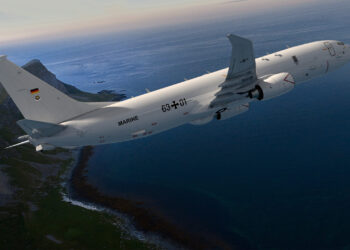DCN, PARIS: At the DCNS central works committee (Comité Central d’Entreprise, CCE) meeting of 4 July 2007, the DCNS management team outlined the work organisation scheme for the FREMM multimission frigate programme. By implementing an innovative industrial and labour policy, DCNS will use its own shipyards and facilities at Brest and Cherbourg to perform tasks that would otherwise have been outsourced to meet the rising cost and competitive performance expectations of the warship market.
Through extended dialogue with employee representatives, DCNS management has determined the arrangements that will allow the company to increase productivity while maintaining optimum working conditions for its employees. These arrangements have been completed in the strictest compliance with the texts currently in force, in particular the company-wide agreement signed by all trade unions in May 2004. The result is a range of creative solutions tailored to the objectives of the FREMM programme, specifically the organisation of shipyards and employment and teaming arrangements.
“These innovative measures will allow us to further improve productivity while at the same time minimising recourse to outsourcing,” commented DCNS Executive Vice President & COO Bernard Planchais. “These open and constructive talks are a prime example of creative management that is profitable for all parties involved in this major challenge in economic, industrial and social terms. This policy reflects our ongoing commitment to serve our customers as effectively as possible.”
Efficient shipyard organization
Besides the top priority the group attaches to compliance with regulations governing occupational health & safety and working hours, the new work organisation scheme aims to make attendance time at shipyards more efficient and productive. Specific measures include the organisation of a dedicated shipyard with its own facilities and a single site manager to whom all personnel will report. To reduce travel and movements, DCNS plans to provide auxiliary services such as locker/changing rooms, canteen and specific stores in close proximity to the yard.
Specialist activities like grinding, welding and coating will be dissociated to improve efficiency and working conditions. To achieve these objectives, workforce versatility will be developed as required, including the acquisition of new skills to complement core expertise. The necessary training will be provided.
Employment: consolidating technical excellence through training
The FREMM programme is expected to create new jobs at Brest and Cherbourg (figures per specialist area and site will be quantified in the next few weeks). DCNS will pursue its ongoing commitment to training in each specialist area where knowledge and skills transfer will further consolidate the company’s core activities and high levels of technical excellence. Through this approach, DCNS has made training a critical function for preserving workforce skills and transferring know-how. More generally, it will be possible to ensure a workload representing the equivalent of around 100 jobs per year at Brest and 50 at Cherbourg, following the proposals of the FREMM working group and the decision of the management team.
Closer teamwork for fast decisions and solutions
The new organisation is designed to allow closer and more efficient teamwork as a crucial factor in improved productivity. As the main players with immediate responsibility for meeting programme milestones and cost targets, the teams will begin and end each work session with a group briefing lasting just a few minutes to resolve any problems as soon as they emerge. In addition, more senior managers will be based at the shipyard to address and propose immediate solutions to any difficulties that could hinder progress.
The shipbuilding phase of the FREMM programme got underway in March 2007 when the Lorient yard cut the first plates for the first frigate. The industrial process for the first tranche is on course for first-of-type delivery in 2011. The second-of-type is scheduled for delivery 13 months later and the others at a rate of one every seven months until 2016.
The aim is to build 1.7 frigates per year in compliance with the French Navy’s schedule, performance and cost targets.
China says holds first dual aircraft carrier drills in South China Sea
China has conducted its first military drills with its two operational aircraft carriers in the contested South China Sea, state...









